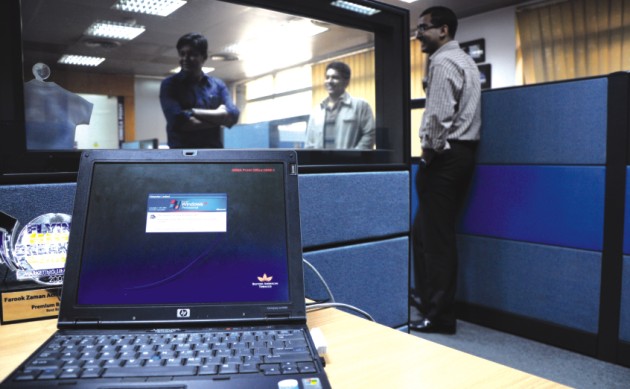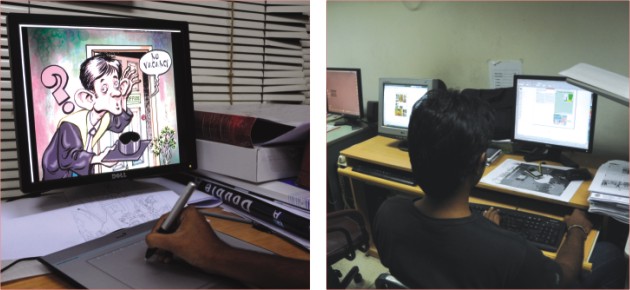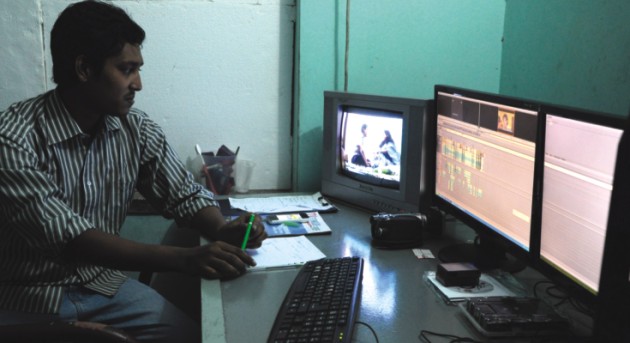| Spotlight
Off The Beaten Track
Sameeha Suraiya
Photos: Yamin Tauseef Jahangir
Location: British American Tobacco

Sticking through one's dreams may seem to be as smooth an affair as it may also prove to be something of an ordeal sometimes. Choosing the right subject and settling for that perfect major are the most crucial decisions of adolescent years. They may well make 'growing up' the most testing times. It is not uncommon to find students in our country pursuing a degree that they are not particularly keen to study. This may be due to a number of reasons that can include considerations of job prospects, fulfilling parents' wishes or simply, lack of options. Also, there are those who do find their programmes extremely fulfilling, but later, upon certain realisations, choose to stray away from the mainstream careers that their degrees aim for, and instead, find success and satisfaction in following a less conventional career path.

In keeping to the change of times, universities around the world are continuously re-modelling their programmes and introducing new ones that appeal to the new generation of students. These degrees are offered with the obvious intention that students are in sync with the demands of current times. Diversity in degrees, more importantly, helps a student find the perfect choice, which allows one to follow his or her dreams, and hopefully, to pursue the dream career. Universities in Bangladesh are yet to offer diversity in their programmes, and more often than not, students are left with limited choices. Some of the most promising paths a student can stride on are considered to be engineering, medical or business centric subjects, among a few others. Although new choices have emerged in the last few years, the number is too small to deem the change significant. The standard of these certain programmes also remain debatable. Amongst the shortcomings, there remain a few who go after their dreams defying the odds, and turning whatever chances are available into opportunities.

Nowadays many graduates are willing to work in the visual and print media as well as in photojournalism
Such is the case of the dentist turned filmmaker, Anisul Haque Emel. For him, studying dentistry was not a personal choice. Rather, it was because his parents wanted him to. After practising for four months, Haque chose to go for something completely off the track, but the very thing that he had longed to do all these yearsthe profession of filmmaking. Theatre intrigued him since school days and he had performed before, having gained much experience working behind the scenes, or more precisely, in art direction from his time at Nagorik Theatre after his college years. In spite of strong parental opposition, Haque attempted to prove them wrong by doing what he loved doing and being successful at it. He is now assisting in a popular drama series called Mukim Brothers besides being busy in performing for Satyajit Ray's play Raja Rani. Haque explains that no matter how difficult circumstances are, one can never go wrong in doing what one does best. Looking back now, he wishes more universities in Bangladesh offered subjects related to theatre and films. Qualifications in these subjects may have a long way to go and reach its full potentiality in Bangladesh, but Haque remains optimistic. He feels the people of this country are full of stories that sometimes go on to produce extraordinary performances. Things are changing too, with more and more educated people joining the professions of acting and directing. Unavailability of proper equipment for making films, however, makes this career a strenuous one.
Filmmaking may have a long way to go in Bangladesh but the number of people wishing to pursue it, whether for a degree, a profession, or simply for a hobby, is definitely on the rise. In fact, making of short films is a growing trend among the young people of Dhaka, who are spinning great stories with whatever material is available to them.
Parents setting down their own expectations for their children is common, especially in our part of the world. Often these expectations act as sources of guidance for young adolescents about to join universities, some of whom have only an inkling of what they want to study. It is only natural for parents to have certain preferences of subjects that they want their children to go for. However, in some cases, expectations from parents are more of demands that need to be fulfilled; that is when things are more damaging rather than being a help, which is why, youngsters are often seen to be slogging after a degree that they neither enjoy nor find fulfilling.
Studying engineering, medical science or business is highly regarded by most parents, and society in general. They are the most sought after subjects in our country. Students pursuing degrees in these subjects are considered to have received the stamp of success and security for the rest of their lives. Subjects other than these coveted few are sidetracked and most of the times, undermined. Concerns over the kind of money that the degree will bring home later on overshadow what one truly desires to study. Also universities in Bangladesh offer degrees so void in diversity that students are only left with subjects that are on popular demand.

Some choose to become cartoonists while others are more interested in graphic designing
Aasha Mehreen Amin, a writer and an editor, shares that the teeming number of private universities claim to follow American curriculum, however, the reality is far from it.
Options are staggeringly lacking. About the multitude of business graduates coming out every year, she finds it impractical and believes that there are only so many BBA and MBA graduates who will end up getting corporate jobs. Amin, a graduate in Finance from Boston College chose her major because she thought it was what she would enjoy most as her subjects in high school were business centric. Later in the course of the programme, she found that she enjoyed courses that would involve a lot of writing. Finance was found dry and she soon realised that she was studying something that she did not find rewarding. If she had the chance once again, she says she would choose English Literature. It was through journalism that Amin began to discover herself. She has been involved in feature and journalistic writing since her graduation. She is one of the fortunate ones; she has found her domain.

Sound Engineers like Sajjad Kabir has struggled to reach a decent ground but his passion for music is never ending
There are so many fields that remain untapped only because students are barely allowed the chance to explore. Liberal Arts subjects are less pursued resulting from the general idea that the professions they lead to can hardly be considered as long-term careers. Exploring philosophy or history, or learning to make music are ideas that our academia is not yet open to. Career prospects can only emerge when qualifications in these subjects are made available. It would be wrong to assume that a graduate of music will fail to curve out a successful career, even though there are many hurdles to cross if one does consider making it a profession in our country. There are people who have risen to the occasion when it all came down to following one's dreams. Sajjad Kabir, a successful music composer and sound engineer. Having completed BBA a few years ago only because it was his parents' choice, Kabir now works and lives for music. Also a member of the band Ridhun, he is looking forward to their album Jodi coming out soon. He says that it would be quite wrong to say that there is no money in this industry. A person can without a doubt, join this profession and be successful if one has the talent. He has no regrets with the decisions he has made; his passion for music allows him to come into contact with like minded people, learn and share ideas and earn well at the same time. The Bangladeshi society may not have welcomed studying and making music as a full time career as of yet, but Kabir sees eagerness in the younger generation who want to learn and know about music before playing it. Availability of different kinds of software and high-tech computers helps the task of making music sound good far easier. Since a lot of his work involves discovering talents, Kabir sees a change as more conscious people are appearing in the industry.
It would be safe to say that today more and more fresh graduates are going exactly for what they want and what they enjoy doing. Making use of whatever options are available, they strive to live as closely with their aspirations as possible. Conventional ideas of sticking to the beaten track that train for a particular career are fast changing. Young graduates are more aware of the world around them and they are increasingly opting for what suits them most, moulding their career paths accordingly.
Ashraful Huda, an ETE student in his final semester plans to take on a different route after he graduates. Although it was entirely a personal choice, Ashraful no longer finds the prospect of this subject particularly appealing. Telecommunications industry is facing low times, according to him, due to mismanagement of the companies as well as BTRC, as a result of which he sees graduates constantly switching jobs. Ashraful has managed to curve out his own niche by choosing to open a coaching centre with a few of his friends where he teaches O and A' level Physics. He enjoys teaching and the venture has been so successful that he now plans to extend his entrepreneurship skills by pursuing a degree in MBA. On a similar note, Zafeer Rahman, upon completing his Bachelors in Pharmacy found that the pharmaceutical companies of the country prefer to recruit students from public universities rather than private. His interest lay in pursuing Hospital Pharmacy, but its prospects are pretty dim, with only a few hospitals in Dhaka alone offering work opportunities. But Zafeer does not plan to let his degree go to waste. Involved in writing since teen years, he now works as a reporter and a photographer, capturing images and stories of those living in health threatening situations. He plans to carry on to Masters in Public Heath, and eventually contribute to improving human conditions in underprivileged areas.

Anisul Haque Emel now spends a considerable amount of time into film making
On a different note, emergence of more flexible, open-ended job opportunities give graduates the perfect chance to try something different with their degrees instead of following the mainstream career. While business graduates flood the various banks and telecommunication companies, some prefer to take a different trek while keeping their degrees to perfect use. Omayr Khan, a graduate in Economics mentions how working at a corporate workplace has never attracted him. He wanted something that would give him the hands-on experience rather than long hours of deskwork, which is why the international NGO seemed perfect. Involved in co-ordinating aid supplies to different parts of the country, Omayr is sometimes required to travel around Bangladesh and witness life as it is, and this he finds to be a far more enriching experience. His inclinations lie towards music too. A member of the acclaimed band, Nemesis, he says he would have definitely chosen to study music had he the chance.
Although the chase for conventional jobs is overwhelming, new channels are slowly opening with the younger generation of graduates venturing into territories less travelled by.
|
Copyright (R) thedailystar.net 2010
|

